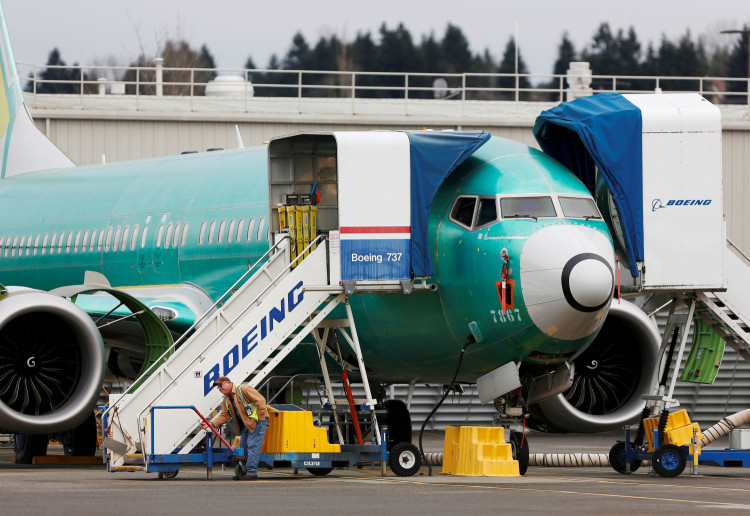Boeing released hundreds of internal messages on Thursday that drew the ire of American lawmakers. The said messages raised questions on how the U.S. jet maker developed the simulators of the troubled 737 Max jets.
According to Reuters, the internal messages show an exchange of instant messages between two employees expressing their concerns regarding the 737 Max planes. An unnamed employee said the design was made by "clowns" and was "supervised by monkeys."
Another message from November 2015 indicated that global regulators would most likely require simulator training for a problem within the cockpit system. The employee said the company will "need support at the highest levels when it comes time for the final negotiation."
Amid the release of the message exchange between unnamed employees, Boeing expressed its commitment towards transparent communications with the Federal Aviation Administration (FAA).
In response to the latest reveal in a series of releases from Boeing as part of its pledge towards transparency, U.S. House Transportation Committee chairman Peter DeFazio expressed dismay over the issue.
DeFazio argued that the unredacted versions of the communication string suggest a "deeply disturbing picture" of the U.S. jet manufacturer's efforts in fending ire from global and local regulators despite the fact that its employees were already letting the company know about their concerns.
On Thursday, Boeing reiterated that all simulators within the 737 Max jets were "functioning effectively," adding that it has completed necessary and repeated testing of the systems ever since the alarms were sounded by employees.
Boeing said the exchange of messages does not reflect the kind of company it should be and that the communications are "completely unacceptable." However, industry experts noted that there is a lesson to be learned amid the fiasco.
The Verge reported that the documents released by Boeing also had a Boeing employee stating, "I still haven't been forgiven by God for the covering up I did last year." Analysts said the employee appears to have referred to communication with the FAA in his 2018 message.
The FAA, on the other hand, said in a statement that agency experts have determined the newly released documents do not indicate any safety or security risks that weren't already revealed previously.
Before the documents were submitted to the U.S. Congress and the FAA, the aviation giant said it would now recommend simulator training to pilots who will fly the troubled 737 Max fleets. It remains to be seen whether this will affect the highly debated recertification of the jets.
Boeing also said in its statement after the reveal that it would continue to support further review by the FAA on the 737 Max jets. The planes were grounded in March following two crashes that took a total of 346 lives.
Boeing released hundreds of internal messages on Thursday that drew the ire of American lawmakers. The said messages raised questions on how the U.S. jetmaker developed the simulators of the troubled 737 Max jets.
According to Reuters, the internal messages show an exchange of instant messages between two employees expressing their concerns regarding the 737 Max planes. An unnamed employee said the design was made by "clowns" and was "supervised by monkeys."
Another message from November 2015 indicated that global regulators would most likely require simulator training for a problem within the cockpit system. The employee said the company will "need support at the highest levels when it comes time for the final negotiation."
Amid the release of the message exchange between unnamed employees, Boeing expressed its commitment towards transparent communications with the Federal Aviation Administration (FAA).
In response to the latest reveal in a series of releases from Boeing as part of its pledge towards transparency, U.S. House Transportation Committee chairman Peter DeFazio expressed dismay over the issue.
DeFazio argued that the unredacted versions of the communication string suggest a "deeply disturbing picture" of the U.S. jet manufacturer's efforts in fending ire from global and local regulators despite the fact that its employees were already letting the company know about their concerns.
On Thursday, Boeing reiterated that all simulators within the 737 Max jets were "functioning effectively," adding that it has completed necessary and repeated testing of the systems ever since the alarms were sounded by employees.
Boeing said the exchange of messages does not reflect the kind of company it should be and that the communications are "completely unacceptable." However, industry experts noted that there is a lesson to be learned amid the fiasco.
The Verge reported that the documents released by Boeing also had a Boeing employee stating, "I still haven't been forgiven by God for the covering up I did last year." Analysts said the employee appears to have referred to communication with the FAA in his 2018 message.
The FAA, on the other hand, said in a statement that agency experts have determined the newly released documents do not indicate any safety or security risks that weren't already revealed previously.
Before the documents were submitted to the U.S. Congress and the FAA, the aviation giant said it would now recommend simulator training to pilots who will fly the troubled 737 Max fleets. It remains to be seen whether this will affect the highly debated recertification of the jets.
Boeing also said in its statement after the reveal that it would continue to support further review by the FAA on the 737 Max jets. The planes were grounded in March following two crashes that took a total of 346 lives.





